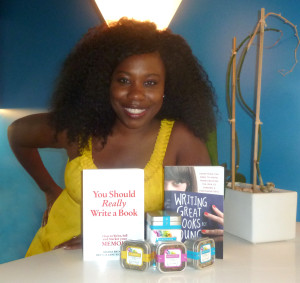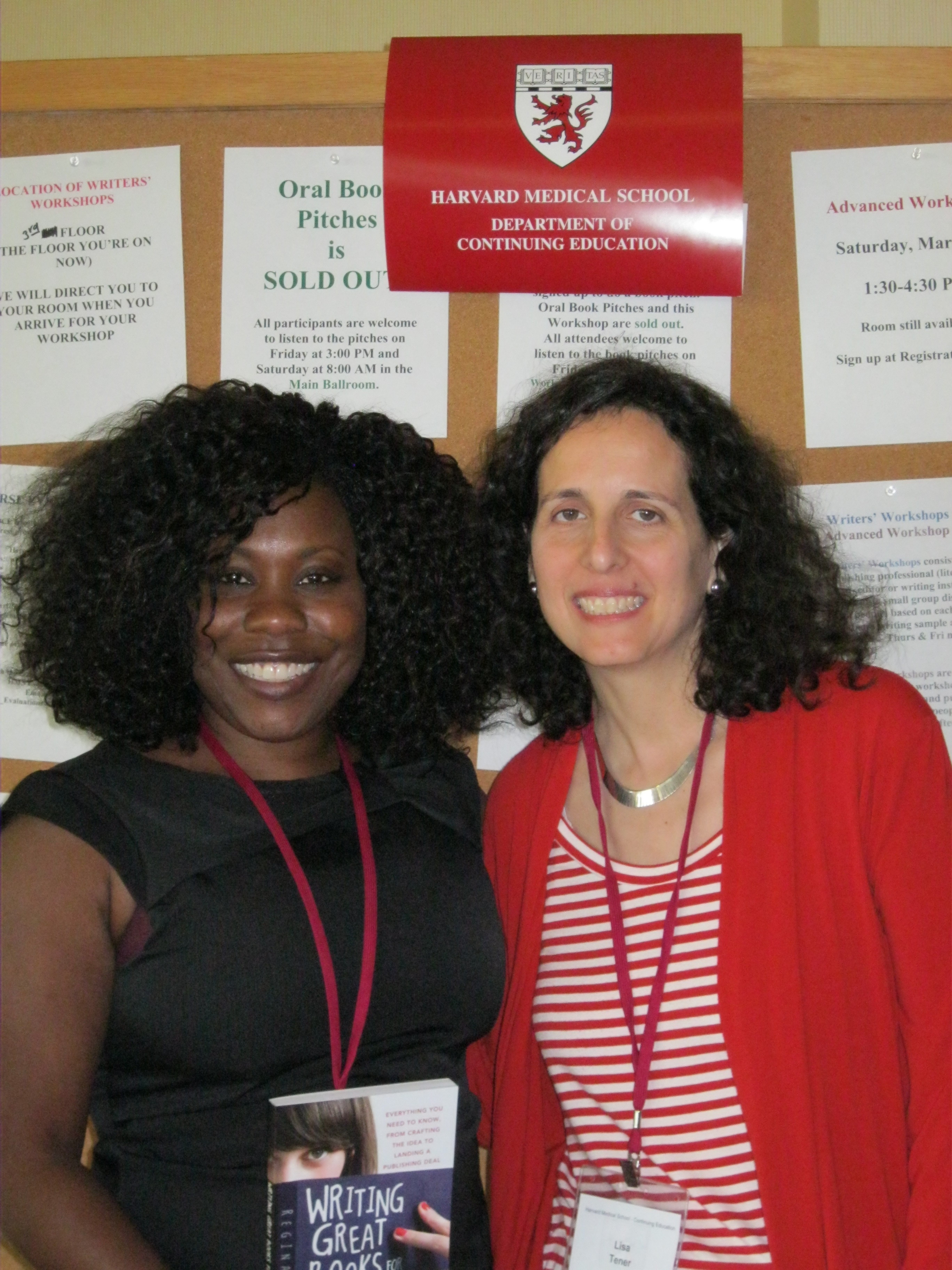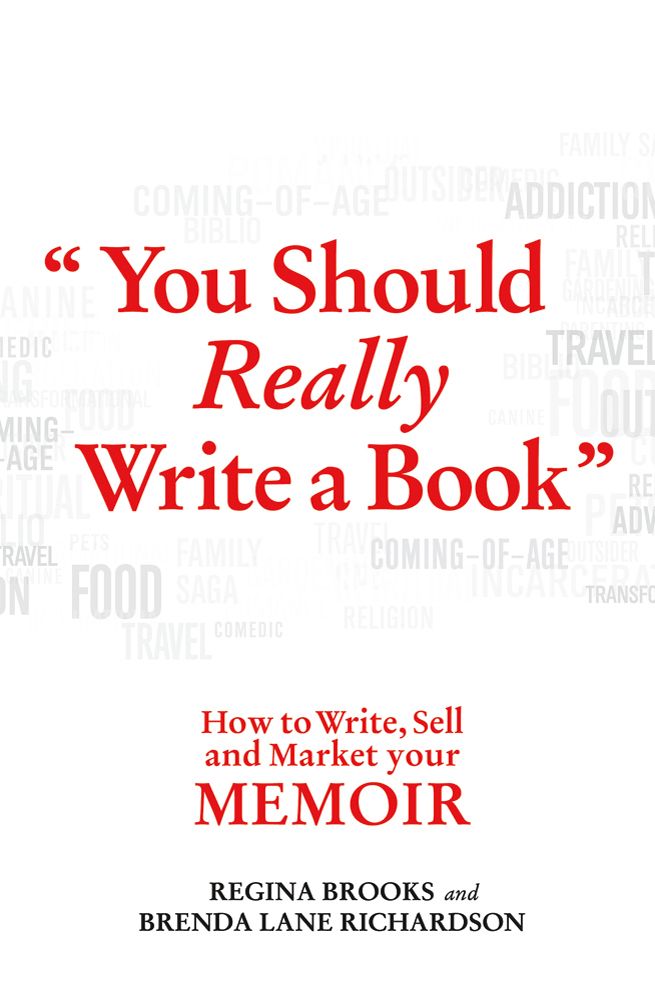
Not long ago, participants in my Bring Your Book to Life Program had the opportunity to ask questions and get answers from a wonderful literary agent and author, my friend, Regina Brooks. Not only did Regina provide insight and insider information about the publishing industry, but she gave special insights into writing and publishing a memoir.
As co-author of You Should Really Write a Book: How to Write, Sell and Market Your Memoir, Regina provided advice that I know you’ll want to hear. [And you can win a copy of her book–read on]
Rachel Horwitz has generously transcribed our class and picked some of the most powerful nuggets for this post (and I added a few asides).
Lisa: Just to make sure everyone on the call is on the same page, can you describe what literary agents do?
Regina: An agent is a person who is essentially a manager for an author. They negotiate contracts, help authors understand trends, shop the book and prepare the project to entice editors or publishers. They are also responsible for ensuring you get royalty statements and mediating issues between the author and publisher such as during cover art disputes.
Lisa: Everyone wants to know, are agents willing to work with new authors?
Regina: Yes. Generally speaking we take ten new authors or so a year. But to be frank, for those of us in the business, it’s easier to take on one author with 10 books in them than 10 authors with one book in them. When you research agents, look for ones willing to take on new clients. New agents are always looking for new talent to franchise and create a brand out of as well.

Lisa: I’d like to point out that a great way to meet agents who are looking for new authors is to attend writing conferences. And anyone writing a health or medically related book should consider Harvard Medical School’s CME Publishing Course, where Regina and I both teach. This year it takes place at the Cambridge Marriott on March 14 -1 6. Regina, other than conferences, can you share some advice for meeting agents?
Regina: The playing field has leveled and nowadays it is much easier to connect with agents. It may surprise some people, but referrals are the best way to get in contact with an agent. Ask a friend with an agent if their agent is taking new clients in your field. If they’re not, they might give you contacts who are. Also, most agents are on twitter, so you can connect with them there and establish a relationship.
Lisa: Once someone feels ready to approach agents, what are the top three things those agents will be looking for?
Regina: 1. A strong author platform, 2. An incredible hook and 3. Solid writing ability. It’s okay to only have two of these three pieces covered when you query, but ideally all three factors are strong. Also, have your book proposal written and a few chapter samples ready to share. Unless it’s a memoir, in which case the narrative should be completed before you query.
Lisa: There are smaller, boutique agencies and larger talent houses for agents. Can you share the difference between boutique agencies and large houses and some of the advantages of each?
Regina: At a boutique agency, it’s easier to contact your agent at any given time. They also seek to nurture their folks longer and tend to stay with you for the long haul. However, they manage a lot of tasks themselves (editorial, sub rights, publicity) whereas bigger houses will have other people working on those tasks. As for large agencies, they tend to have larger teams, each working on a different sector of the book business and likely have deeper connections than a boutique agency. In this case, as the author, you’re potentially working with more people. These agencies are also more likely to move their agents in and out, so you may or may not keep your agent over time.
Lisa: Another question that many class participants sent in is whether publishers are interested in selling memoirs written by unknown authors.
Regina: It can be harder to get publishers to bite if you’re not well known, but there’s still a market. Since you won’t come to the table with a celebrity persona, publishers want to know you can do what you say you’ll do to promote the book. Having experience in some sort of marketing plan prior to sending your proposal is great. After all, throughout your platform, only 1-5% will actually buy your book.

Lisa: People also want to know if you recommend posting a memoir snippet on a blog or publishing it in a magazine before getting the book published.
Regina: Yes, you can, but keep it short. That can be a great way to develop an audience.
Lisa: Can it ever be detrimental?
Regina: Yes, especially if people in the audience don’t connect with the material.
Lisa: On a similar note, could you let emerging authors know common mistakes they should avoid?
Regina: Absolutely. Not trying hard enough to get people excited about their topics. That’s a common mistake. They feel they’re gloating or being pushy, but you’re not. Also, sometimes people ignore immediate connections that will help publicize their book because they aim too high. Or even more common, people get overwhelmed with social media when it’s all about engagement more than the numbers.
Lisa: Any tips for how-to writers?
Regina: Make sure someone else hasn’t already told people “how-to” in your unique way.
Lisa: Any final advice?
Regina: Research is your best friend. Research your topics, other books, and agents. The more you know, the better off you’ll be when it comes time to submit to publishers and editors.
Writing a memoir? I highly recommend You Should Really Write a Book: How to Write, Sell and Market Your Memoir. Want to win a copy:
Have any questions? Ask them below and Regina or I will answer. Best question or most insightful comment wins a copy of Regina’s book!
Regina Brooks is the founder and president of Serendipity Literary Agency LLC, based in Brooklyn, New York, which represents a diverse base of award-winning clients in adult and young adult fiction, nonfiction, and children’s literature.
You can read more about her bio on the above website, but if you want to meet her in person, join us both at Harvard Medical School’s CME publishing course on March 14-16, 2013. There, you can ask Regina–and all the faculty– agents, publishers, book writing coaches, like me–any questions about publishing as well as get feedback and advice on your specific book concept.



Great post with essential information- I really enjoyed the conversation I had with Regina both in your class and at IWWG.
What is the best way to pitch a memoir you’re writing for someone who is successful and has a platform?
You’ll still need a book proposal, but start your overview with something that gives a sense of the size and scope of the author’s platform (as well as the story of course).
When the person has a great platform be sure to articulate it in the query
letter. We talked about the three things you need to successfully sell a
memoir: hook, writing and platform. If you have 2 out of the 3 your well
on your way to getting representation or selling you work to a publisher
Regina,
Is a book of devotions about the author and her topic a memoir?
Hi Jean Ann, Do you mean a book of devotions paired with stories about the author’s experience?
When the person has a great platform be sure to articulate it in the query letter. We talked about the three things you need to successfully sell a memoir hook, writing and platform. If you have 2 out of the 3 your well on your way to getting representation or selling you work to a publisher.
No not really. That would be considered narrative non fiction.
Hello Lisa and Regina,
Today I think I am experiencing some “serendipity” of my own by stumbling into your blog. I recently negotiated all of my Friday’s off of my “day job”. I plan to devote a major portion of that day to working on “My Book” – i.e. The Book that I KNOW is waiting (rather impatiently) inside of me to find it’s way OUT, and has been haunting me for years whereupon I have continually said ‘someday’, but now finally realize that I am going to DIE if I don’t create ‘someday’ RIGHT NOW!
OK. You get the idea.
So, yesterday (my first official “Writing Friday”) I spent staring into space a lot, doodling, surfing the internet reading about new authors in my area, reading the titles and summaries of their books, checking out their blogs, investigating who their agents and publishing houses are, experiencing severe writer-envy and self-pity while writing four pitiful “I am your newest fan” comments on said blogs.
Then, I actually wrote two personal blog posts, three emails to friends, two letters and one grocery shopping list.
Ta-da! I am a writer!
Today I picked up where I left off by attempting to Google what the terms “Good Deal”, “Significant Deal” and “Pre-empt” means on a Literary Agent’s “Recent Deals” page. I did not find the answer, but I did find Lisa Tenet’s Blog.
I signed up for her free mini-course.
I “liked” her Facebook page.
I read this blog post.
I wrote a rambling comment in hopes of winning a free copy of Regina’s book (with the cool title)!
Additional Pitch To Win The Book:
You may rest assured your book will coming to a good home. I spent the last 36 years of my life journalling almost every day (beginning at age 10…so now you know how old I am). That amounts to nearly 50 hard-bound journals and notebooks sitting on a tall bookshelf in my computer room looming over me. I’m fairly certain that there’s at least ONE “Book” hiding in all of that, don’t you think? Personally, I suspect there could be an unending supply of material. But, it requires that I go on a fishing expedition to sort through the junk in hopes of a few jewels. At this point I need some help knowing what to look for. I don’t necessarily intend to write a memoir (although, I suppose I already have?). I’ve thought about writing a YA novel in the style of a memoir. I journaled religiously every day of my teen years. Sometimes twice per day. It was my therapy. All of that writing saved my life many times. (Literally)
In conclusion of my mini-novella comment, I don’t have a “best question”, but I would be interested if either of you could explain what “good deal”, “significant deal”, and “pre-empt” mean?
🙂
Thanks! – Holly A
Holly: From Publisher’s Marketplace:
“nice deal” $1 – $49,000
“very nice deal” $50,000 – $99,000
“good deal” $100,000 – $250,000
“significant deal” $251,000 – $499,000
“major deal” $500,000 and up
Hi! Thanks for fielding these questions. My question is related to this post, but perhaps a little more specific: does it reflect positively or poorly to self-publish first, then seek an agent later?
The reason I ask is because I tried getting my memoir published, but despite pieces of my story appearing in the New York Times and the Chicken Soup series, I got no bites for a year. So, I tried my hand at self-publishing and sold about 2,500 hard copies of my book in its first year. I didn’t pay for any book marketing, it was merely word-of-mouth that got any of the books sold.
I’m hoping to start looking for literary agents again, but am not sure if mentioning that I self-published already would ultimately hurt or help my book.
Thank you!
Danger, That’s a great question and congratulations on selling 2,500 copies just by word of mouth. That number certainly speaks to the potential of the book. The magic number I often hear is that if you sell 15,000 copies of a self-published book, trade publishers start to become interested. I don’t know if that number has gotten higher but I doubt it’s much less than that unless in specific instances where the book seems very marketable or, in the case of a memoir, the writing is extraordinary.
Since publishers expect the author to market the book, the fact that you haven’t done much marketing would not be a big selling point. Perhaps you can do more marketing, get your sales up and then look for representation. If the writing is amazing, you may be able to get interest with lower sales than 15,000, but publishers will still want to see that you are marketing.
And we have a winner… Danger, you have won a copy of “You Should Really Write a Book.” Please e-mail me your address and I will mail Regina’s book to you! Congratulations. While your book is written, you’ll find advice to sell and market your book as well.
I have just self-published my first children’s book with xlibris which was a wonderful experience, but now I am ready to get an agent and expand my horizons. I have 10 more books written and some have the illustrations finished as well. I think I would love Regina Brooks to be my agent and I plan to contact her now. I thank you for posting this interview. Check out BESSIE SUE HELPS HER PARENTS, my first book, available online on amazon, barnes and noble, and other websites. I ask GOD to grant you a great day! Sincerely, Jocelyn Sophia Poesnecker
Congratulations on your first book, Jocelyn. Good luck with it. Regarding agents, do check on the types of children’s books Serendipity (Regina Brooks) represents to make sure it’s a good fit. You can check on the website.
Good luck.
I have a question for Regina about book proposals. I am writing a collection of humorous essays. Initially the work was a narrative memoir, but has morphed into the essay format. I know that for memoir the entire ms must be completed before submitting a proposal. Is the same true for an essay collection? Thanks.
Hi Diane, No you will only need to do a proposal and a sample of 3 essays. That should suffice.